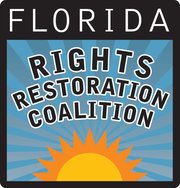By Desmond Meade, President, Florida Rights Restoration Coalition
On Thursday, March 8th, Florida International University College of Law’s chapters of the American Constitution Society and the Federalist Society held a debate concerning Felon Disfranchisement. Marc Mauer, president of The Sentencing Project and Roger Clegg, president of the Center for Equal Opportunity offered their views on whether ex-felons should have the right to vote. A spirited debate which got testy at times, gave the audience an excellent view of the polarized viewpoints on an issue in the spotlight in Florida because of the upcoming Presidential election, the role that Florida will play in that election, and the current clemency policies of Governor Scott and his Cabinet.
Thursday's event promoted a moral and legal discussion not just on felon voting rights, but on how disenfranchisement policies are tied to broader questions about the role of democracy in shaping political and social equality. Students pointed out the effects of systemic racism and the war on drugs to criticize Florida's disenfranchisement policies, and expressed concern over the unprecedented expansion of the US prison system.
It instantly became apparent that in order to justify felon disfranchisement, a negative image of impacted individuals had to be developed. From the viewpoint of Mr. Clegg, it would seem that all felons were terrorist assassins who burned, and pillaged our cities. This fictional felon created by Mr. Clegg became the basis of his position that the fundamental right to vote should be denied to all felons, even after they have repaid their debt to society.
Mr. Clegg eventually had to admit that the fictional character he created was a grossly inaccurate depiction of the typical individual impacted by these policies. Mr. Clegg, however, chose to ignore the detrimental impact felon disfranchisement have on the families of formerly incarcerated individuals, and the communities in which they live. Mr. Clegg was unable to reason away the reality that every time a person is disenfranchised, their community loses a voice, and for every voice that a community loses, the more insignificant that community becomes in the eyes of elected officials who are driven by votes.
Florida currently has over 1 million disenfranchised residents, and that number will continue to grow due to clemency policies that make civil rights restoration virtually impossible. That’s over 1 million individuals who, while paying taxes, are prevented from voting, and are severely restricted from obtaining safe and affordable housing.
In the debate, Mr. Mauer correctly surmised that the basic principles of civility and citizenship dictate that all individuals are entitled to have the right to vote; the right to have their voices heard, and participate in the decisions that govern the society in which they live. Mr. Mauer also exposed the absurdity of the unfounded notion that civil rights restoration is a threat to the voting process. The fact is that the real threats to voting are preventing or restricting eligible voters from casting their vote freely, and adopting policies that disenfranchise citizens, in many cases for life.
In a recent CNN online poll,
only 20% of responders believed that an ex-felon should not regain their rights to vote .
Obviously the majority of Americans do not believe in Mr. Clegg’s “boogie man” convict.
(Bobby Joe Bracy contributed material for this post).

